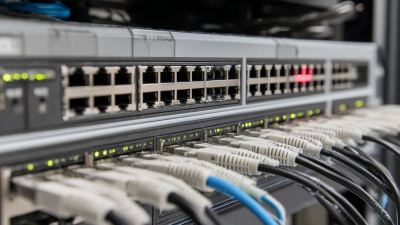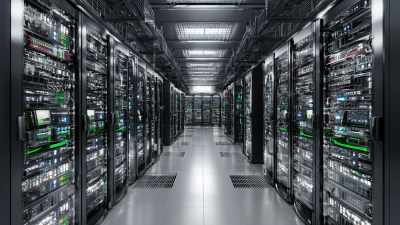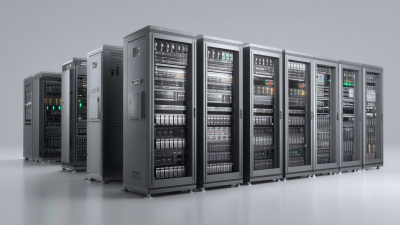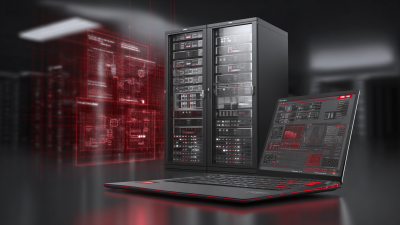Leave Your Message
As the digital landscape continues to evolve at an unprecedented pace, effective networking solutions have become paramount for organizations striving to maintain a competitive edge. According to a recent report by Gartner, the global enterprise network equipment market is projected to reach $60 billion by 2025, underscoring the growing need for sophisticated networking technologies.
 Juniper Networks is at the forefront of this transformation, leveraging innovative approaches such as AI-driven automation and advanced security features to redefine connectivity. With a strong commitment to enhancing user experience and operational efficiency, Juniper Networks is not just responding to industry demands but actively shaping the future of networking. Their strategic focus on next-generation architectures enables businesses to unlock new opportunities, streamline operations, and drive sustainable growth in an increasingly interconnected world.
Juniper Networks is at the forefront of this transformation, leveraging innovative approaches such as AI-driven automation and advanced security features to redefine connectivity. With a strong commitment to enhancing user experience and operational efficiency, Juniper Networks is not just responding to industry demands but actively shaping the future of networking. Their strategic focus on next-generation architectures enables businesses to unlock new opportunities, streamline operations, and drive sustainable growth in an increasingly interconnected world.
Juniper Networks is at the forefront of transforming network efficiency through its innovative approach to Software-Defined Wide Area Network (SD-WAN) adoption. In an era where businesses require seamless connectivity across diverse geographical locations, Juniper's SD-WAN solutions offer a robust framework that enhances performance while reducing operational costs. By integrating advanced analytics and automation, their technology not only optimizes network traffic but also provides real-time insights, empowering organizations to make data-driven decisions.
Moreover, Juniper Networks emphasizes a secure and simplified network architecture that accommodates the complexities of modern digital communication. Their SD-WAN solutions enable businesses to connect securely to cloud services and branch offices, all while maintaining compliance and protecting sensitive data. This holistic approach ensures that as companies scale, their networks remain agile and resilient, ultimately shaping a more efficient digital landscape. With Juniper's commitment to innovation and customer-centric solutions, businesses can unlock new levels of productivity and connectivity that are essential for future success.

In the evolving realm of cybersecurity, Juniper Networks is at the forefront, leveraging artificial intelligence to enhance defense mechanisms against increasingly sophisticated threats. The integration of AI into security protocols allows for real-time threat detection and faster incident response, minimizing the potential damage from cyberattacks. By analyzing vast amounts of data, Juniper’s AI systems can identify patterns and anomalies that signify potential vulnerabilities, offering a proactive approach to network security.

Moreover, Juniper's AI-driven tools empower organizations to automate security operations, freeing up valuable resources that can be redirected to other critical business functions. This shift not only streamlines security management but also ensures that defenses are continuously updated to counter emerging threats. As cyber threats continue to evolve, companies relying on Juniper Networks will benefit from a dynamic and adaptive security landscape, reinforcing their resilience against cyber risks while promoting a more secure digital environment.
In the rapidly evolving digital landscape, data-driven insights have become pivotal for enhancing network performance. Juniper Networks is at the forefront of this transformation, leveraging advanced analytics to provide actionable intelligence that empowers organizations. By utilizing machine learning algorithms, Juniper's analytics capabilities can predict network issues before they arise, optimize resource allocation, and offer a comprehensive view of network operations. This proactive approach not only reduces downtime but also enables businesses to respond swiftly to changing demands.
Moreover, Juniper’s emphasis on automation through its analytics tools allows for streamlined network management. By automating routine tasks and integrating real-time data analysis, organizations can significantly enhance their operational efficiency. This integration fosters an environment where IT teams can focus on strategic initiatives rather than being bogged down by manual processes. As a result, the blend of sophisticated analytics and automation is setting a new standard in network performance, paving the way for more resilient and intelligent networking solutions in the future.
As the demand for high-speed connectivity continues to surge, Juniper Networks is at the forefront of future-proofing infrastructure, especially with the advent of 5G and the Internet of Things (IoT). According to a recent report from the International Telecommunication Union, by 2025, there will be an estimated 75 billion connected devices globally, underscoring the critical need for robust and flexible network architectures. Juniper's commitment to integrating advanced technologies is not just a response to these trends; it’s a proactive strategy to ensure that networks are capable of handling the massive influx of data generated by connected devices.
Furthermore, a study by Gartner predicts that by 2024, 50% of organizations will deploy multi-cloud environments, necessitating seamless connectivity and interoperability. Juniper is innovating with solutions that prioritize automation and security, which are essential for managing increasingly complex networks. Their focus on a cloud-ready infrastructure is shaping a digital landscape where operators can swiftly adapt to market changes, thus enabling businesses to harness the full potential of 5G and IoT without the fear of obsolescence.
As the demand for digital connectivity surges, Juniper Networks is positioning itself as a leader in promoting sustainable networking solutions. The company recognizes that traditional networking infrastructure can have a considerable environmental impact. Therefore, it has implemented innovative strategies aimed at reducing carbon footprints while enhancing operational efficiency. By developing energy-efficient hardware and software solutions, Juniper is not only optimizing network performance but also contributing to a greener planet.
Moreover, sustainability at Juniper extends to promoting circular economy principles in its operations. This includes designing products for longevity, encouraging recycling, and minimizing electronic waste. Juniper's initiatives also involve harnessing renewable energy sources for data centers and facilities, ensuring that their operations align with broader environmental goals. Through these committed efforts, Juniper Networks is setting a new standard in the tech industry, demonstrating that eco-friendly practices can go hand in hand with cutting-edge digital solutions, thereby shaping a more sustainable digital landscape for the future.
| Strategy | Description | Impact Area | Estimated Reduction (%) |
|---|---|---|---|
| Energy-Efficient Hardware | Utilizing advanced technologies to minimize power consumption of networking devices. | Energy Consumption | 30% |
| Optimized Data Centers | Implementing innovative cooling and resource management systems in data center operations. | Cooling Efficiency | 25% |
| Renewable Energy Sources | Transitioning to solar, wind, and other renewable energy solutions for powering infrastructure. | Carbon Footprint | 40% |
| Circular Economy Practices | Promoting recycling and upcycling of networking equipment to reduce waste. | Waste Reduction | 35% |
| Sustainable Supply Chain | Working with suppliers that adhere to environmental regulations and sustainability practices. | Supplier Responsibility | 20% |






